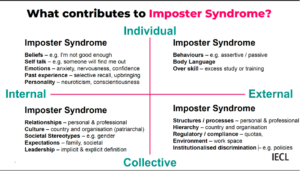The Imposter Syndrome.. I’ve heard about it, but what does it actually mean?
It’s the nagging voice that tells you that you’re not good enough. Or the one that intervenes in an opportunity to kill it off so that you don’t get a chance to fail in front of your peers. The one that comes up with an excuse for why you can’t do something before the offer has even been fully made. The voice that tells you that you don’t belong in amongst your colleagues, your peers. That they are more special, that they know more, do more, work harder.
Somehow are just “better”.
Even though, on all objective evidence that is not the case.
How does it show up?
- Self doubt (nasty self talk and doubt getting in the way of what you need to say and do).
- Trying to be the smartest person in the room (not wanting to ask the stupid questions or indeed any questions that may bring attention to yourself).
- Thinking that everyone is looking at you, judging you, thinking about what you’re saying (hint – they’re not – they are too busy worrying about themselves).
- Avoiding failure at all costs (this is a bit aligned to the fixed mindset that Carol Dweck talks about). A growth mindset will embrace failure as a learning and growth opportunity, a fixed mindset will do anything to avoid it.
- Actively avoiding or disregarding negative feedback or criticism. Or taking it so to heart that it’s paralysing and stops you doing anything.
In short, it shows up as the voice in your head that translates to behaviours that stop you being the best that you can be. The one that tells you that you are not yet good enough to play with the big boys. The one that looks for evidence to support how everyone else is better, and is doing better than you because you are just.not.good.enough.
It’s exhausting. It can be unhelpful and it’s destructive to your career and your life.
And research suggests that it affects all of us to some degree or other.
The Impacts of Imposter Syndrome
The imposter syndrome can be exhausting. It can impact:
Personally – creating more feelings of fear, doubt, anxiety and uncertainty. It’s tiring because it takes up cognitive capacity. It lowers self esteem and may contribute to mental health issues.
Career – it may lead to not seeking out promotions or new roles. Or behaving in carer limiting ways. Or feeling the need to “prove” yourself over and over again, by working harder, longer etc.
Relationships – it may lead to provoking arguments or assumptions around being judged or rejected. It may lead to keeping people at a distance for fear of being found out. Possibly a greater investment in work than home life. And possibly limiting social interactions.
Performance – it can mean more time is invested than is required. I once watched someone spend two hours crafting a one paragraph email. Yes, it was important, but not THAT important. When it becomes paralysing, over time, it reduces the ability to perform. There can be self appointed unachievable targets or expectations set.
Wellbeing – can lead to negative emotions and self talk and consequent impacts. Can lead to increased stress and burnout. Can lead to a flow on impact in relationships. Can increase cortisol (which on an ongoing basis is not good). Can lead to physical manifestations around sleep, weight, fatigue and inflammation.
In short.. On an ongoing basis – it is not good!
What sort of imposters are there?
Do you recognise yourself in amongst one or two of these?
The Perfectionist – the one who is never satisfied, and always feels that their work could be better. Rather than focussing on their strengths, they tend to fixate on their flaws of mistakes, leading to high amounts of self pressure and anxiety. This is the person who might spend hours crafting one email.
The Superhero – feels compelled to keep pushing themselves to work as hard as possible (often due to their feelings of inadequacy). “If I can just work harder. Do more… .”
The Expert – are always trying to learn more and are never satisfied with their level of understanding. Even though they are often highly skilled, they often underrate their own experience. This person might be the never ending student, always on the hunt to learn more. They probably have a bookcase stuffed full to the brim of books and journals.
Natural genius – the person that sets excessively lofty goals for themselves and then feels crushed when they don’t succeed on their first try.
Soloist – tend to be individualistic and prefer to work alone. Their self worth often stems from their productivity, so they often reject offers of assistance.
What contributes to Imposter Syndrome (with thanks to the IECL for the graphic)

Is it a female thing?
It used to be that the imposter syndrome was predominantly considered to be a female issue, but we now know it affects men and women almost equally.
In women it can manifest because of:
- A lack of role models
- Male dominated workplaces and leadership with inherent bias
- Feeling less confident (in some instances) than men
- Stereotypes about women (ie – that they are more emotional)
- Being penalised for self assured, confident behaviour (or behaviour that looks more “male”)
- Whilst women’s confidence increases over time (to be more than men by end of career, there’s still that research that shows that women feel they need to meet 100% of the requirements of a role before they apply compared to men, who typically will apply if they meet 70% of the requirements
And in men:
- There can be higher expectations because of the patriarchal nature of workplaces
- They can suffer more stress when their performance is challenged
- Many men feel the same imposter syndrome as women..
What can you do about it?
Recognise the feelings of self doubt, own it, and take it a sign that you care
In her article, Imber speaks about Abbi Jacobson who talks about her own feelings of being an imposter:
“I’m happy that I still get very nervous, even if I maybe shouldn’t be. … I want to always be looking at myself and questioning where I am in my career. I want to be measuring how far I’ve come and know that there’s still so much farther to go. Even if I’m really confident in what I’m doing right now and the projects I’m working on, I still can be so much better.” Hearing Abbi’s perspective made me interpret my feelings of imposter syndrome in a different light. What if I started to think of my nerves as positive things? What if I reinterpreted them as energy boosters, or proof of how much I care? Now I tell myself that I’m nervous, not because I shouldn’t be here, but because I’m excited to share whatever it is that I am about to say.
Be curious – ask the questions
There’s something about someone who loves to learn, who approaches life with curiosity. It’s a thing to watch, particularly when delivered with confidence. Stop worrying about asking the stupid question. Stop self censoring, and reframe to what you could learn if you approach with curiosity and interest.
Look for opportunities to grow, develop and learn – even, ESPECIALLY, if there’s no guarantee of success
Imber says that if you’re not doing something because you’re scared of failing, then that is a pretty good sign you probably should be doing it.
Seth Godin has a great explanation of this fear in his wonderful book Linchpin. Reading this holds a mirror up to each one of us, he shows how we can rationalise away almost anything for fear of doing something different. “The hard part is distinguishing between quitting because the resistance wants you to (bad idea) or because the resistance doesn’t want you to (great idea). The goal is to quit the tasks you’re doing because you’re hiding on behalf of the lizard brain and to push through the very tasks the lizard fears..”
As Seth says “fear is the best compass you have that you are on the right track.”
Feedback
This is a bit of a tricky one. Imber says to embrace feedback as a way to grow and develop. Largely, I agree with her. But whilst she suggests that feedback is rarely personal and is usually about helping the person get better, I would suggest to apply a lens to all feedback – negative and positive. What is their motivation in providing this feedback? Are they credible and is their opinion one that you care about?
According to Amantha Imber, there’s plenty you can do to help make friends with your inner imposter. She says:
The big idea? Make friends with your imposter syndrome and stop seeing it as a weakness. The most successful people in the world embrace self-doubt and are not afraid to look stupid. And if you’re avoiding doing something because it makes you nervous, remind yourself that these experiences are the richest ones for helping you learn.
Other things you can do
- Reach out to others
- Just do it (feel the fear and do it anyway)
- Pay attention to your wellbeing in the most holistic sense
- Pay attention to your thinking. Reframe, fact check, look for objective evidence, reflect not ruminate..
- Use realistic measures of success.
The Takeaway
Recognising imposter syndrome when it raises its head is a positive place to start. Recognising the behaviour that comes from the imposter syndrome and that it is a choice. Have some direct conversations with yourself around what success is for you. And what improvement looks like.
- What does a 1% improvement look like each month/quarter?
- What would be different for you?
- What would be different if you didn’t let your imposter get in the way?
- What would need to change to make that happen?
- What are some manageable steps you could put in place to make that happen?
So many questions 🙂
More Reading..
- Blogs referencing the wisdom of Seth Godin
- Take the quiz – how big is your imposter syndrome?
- ABC Radio National podcast – https://www.abc.net.au/radionational/programs/this-working-life/taming-imposter-syndrome-at-work-v1/13419630
- HBR – https://hbr.org/2021/05/how-to-make-friends-with-your-inner-imposter
- https://hbr.org/2016/07/everyone-suffers-from-imposter-syndrome-heres-how-to-handle-it
- https://hbr.org/2021/02/stop-telling-women-they-have-imposter-syndrome
- https://hbr.org/2019/02/mentoring-someone-with-imposter-syndrome
Want more still…….
If the above has whetted your appetite, and you’re keen for more.. Here are some ideas:
Does leadership interest you? You can sign up to my FREE seven day “Be a Better Boss Challenge” by clicking here. And you can click here to buy my book.
Are you moving into management, and want some practical, tangible skills that will set you up for success? Check out our six month programme here: JETTG MiM flyer August dates. Or get in touch if you’d like an in house programme by clicking here..
Want to chat? Click here to get in touch.
Want some help in meeting your goals? Sign up to the permission to dream programme, by clicking here.
Want more to read? You can read any of the 300+ blog posts on this site, by clicking here.
See you soon,



